Is the herpes vaccine "the elixir of longevity"? Latest research reveals it may protect against cardiovascular diseases, prevent dementia, and even help you live a few extra years!
Release time:
2025.09.28
Eight postdoctoral researchers share science outreach.
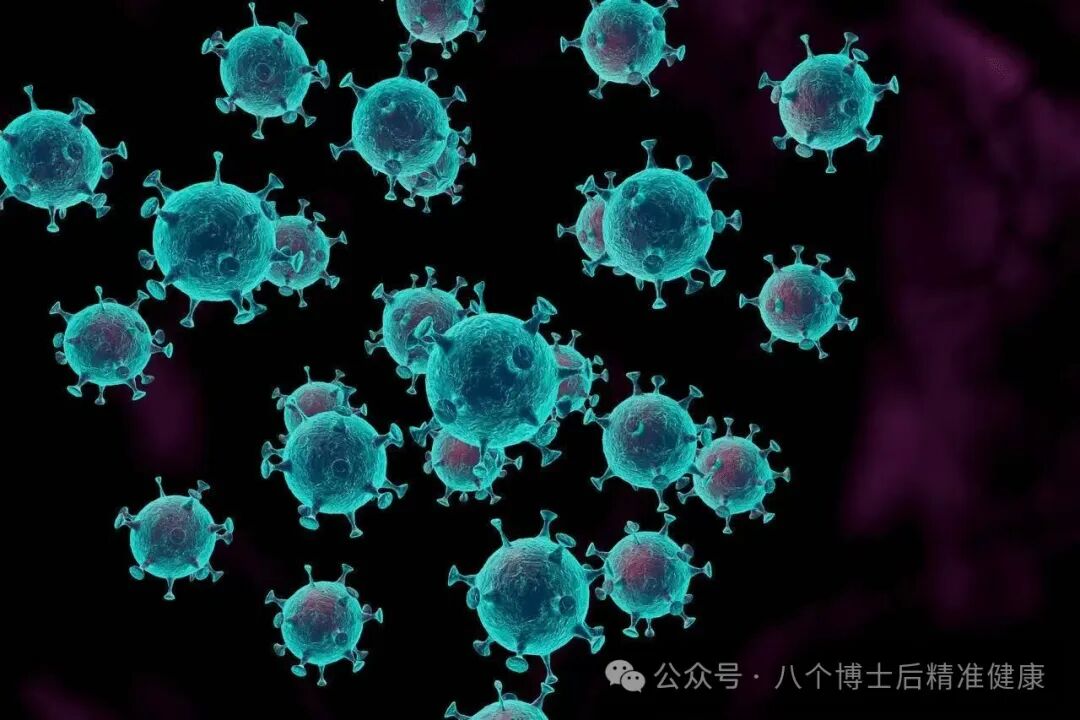
This Issue's Introduction
Could there really be a life-saving longevity vaccine? Could getting the herpes vaccine actually significantly reduce the risk of cardiovascular disease?
New evidence suggests herpes vaccine may protect against dementia! But why does the shingles vaccine "cross over" to reduce dementia risk?
United IPSC Advanced Therapy—Bringing New Hope to Patients with Cardiovascular Diseases and Alzheimer's!
Summary
Latest research overturns conventional wisdom: The vaccine originally developed to prevent shingles has unexpectedly demonstrated "cross-border" benefits—significantly reducing the risk of cardiovascular diseases and even potentially delaying or preventing the onset of Alzheimer’s disease in older adults!
Meanwhile, by integrating cutting-edge regenerative medicine technologies such as iPSCs (induced pluripotent stem cells), scientists are paving the way for revolutionary new treatments that hold immense promise for cardiovascular and neurodegenerative diseases. And when the vaccine defense meets regenerative medicine, "longevity" might just become something truly "designed"!
"Shé Chán Yāo" can be fatal if it spreads in a full circle.
This kind of excruciating pain is called "shingles"!
Someone has been in pain for 40 years!

(Wikipedia – Shingles)
Shingles is a disease caused by the varicella-zoster virus (VZV), which not only leads to a painful rash but can also trigger a range of serious complications—especially for older adults and individuals with weakened immune systems!
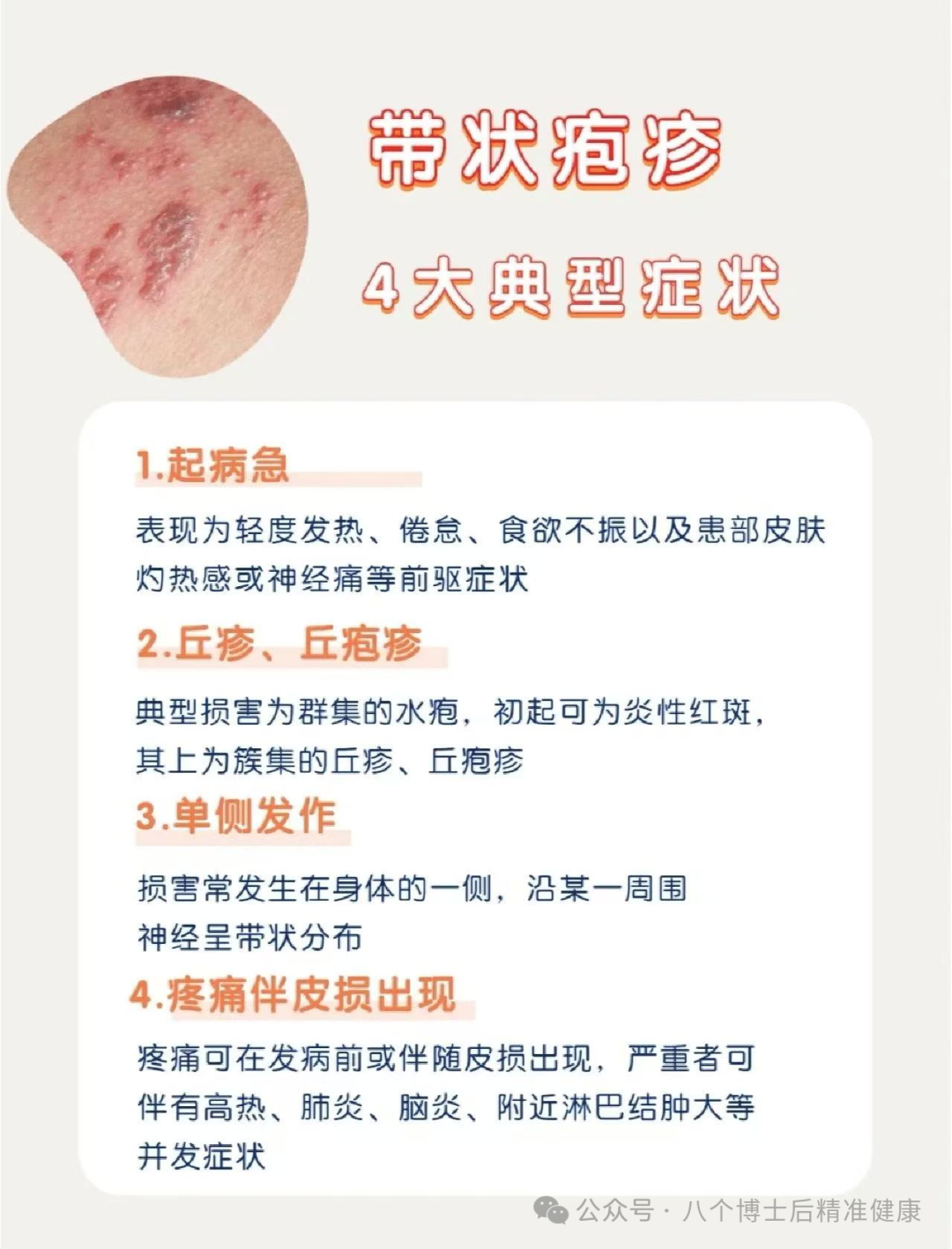
According to statistics
About one-third of people will, at some point in their lives,
At least one episode of shingles is likely to occur.
Meanwhile, the population in our country aged 50 and above
Approximately 1.56 million new cases of shingles occur each year!
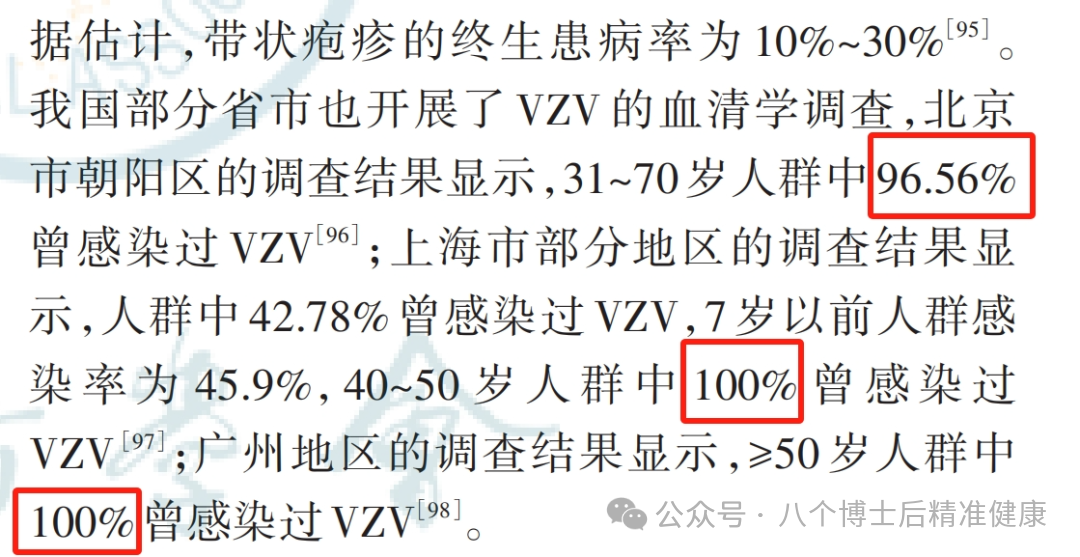
"Expert Consensus on Vaccine Use for Common Infectious Diseases in Community-Dwelling Elderly"
Shingles, triggered by the reactivation of the varicella-zoster virus (VZV), can not only cause neuropathic pain lasting for months or even years, but also lead to more serious systemic illnesses...

(Pictures may cause physical discomfort—please view with caution.)
In fact, the significance of the shingles vaccine has long gone beyond just "preventing rashes"!
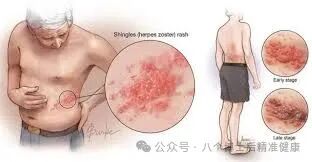
(Pictures may cause physical discomfort—please view with caution.)
Recent, authoritative international studies have revealed that receiving the shingles vaccine not only significantly reduces the incidence of shingles but also unexpectedly lowers the risk of cardiovascular events such as heart attacks and strokes—and is even linked to a lower rate of Alzheimer’s disease in older adults. The "cross-border protective effect" behind the vaccine is now drawing widespread attention from the medical community!
One NEWS
Could there really be a life-saving longevity vaccine? Could getting the herpes vaccine actually significantly reduce the risk of cardiovascular disease?
When we talk about the shingles vaccine, most people’s first reaction is: "Oh, that's the one that prevents skin blisters." But you might not expect it to have far greater significance than that...
Latest research reveals: This vaccine may be quietly protecting your heart and blood vessels—and could even help extend your lifespan!

Cardiovascular diseases (CVDs), also known as circulatory system diseases, are a group of conditions affecting the heart and blood vessels, including stroke, coronary heart disease, peripheral artery disease, rheumatic heart disease, congenital heart defects, heart failure, cor pulmonale, atrial fibrillation, hypertension, and more.
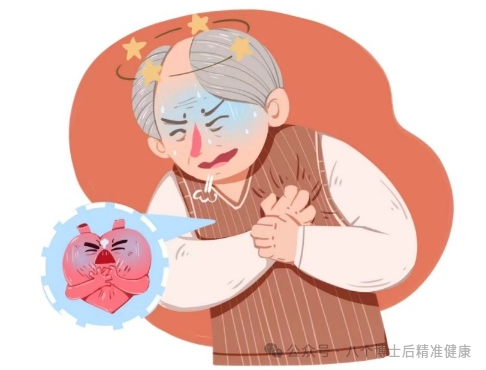

(The Current Epidemiology of Cardiovascular Diseases)

Recently, a research report titled "Live zoster vaccination and cardiovascular outcomes: a nationwide, South Korean study" was published in the international journal *European Heart Journal*.
Scientists from institutions including the Kyung Hee University College of Medicine in South Korea conducted a large-scale study and found that individuals vaccinated against shingles experienced a 23% reduction in the risk of cardiovascular events—such as stroke, heart failure, and coronary artery disease. This discovery undoubtedly offers a fresh perspective on the prevention of cardiovascular diseases!
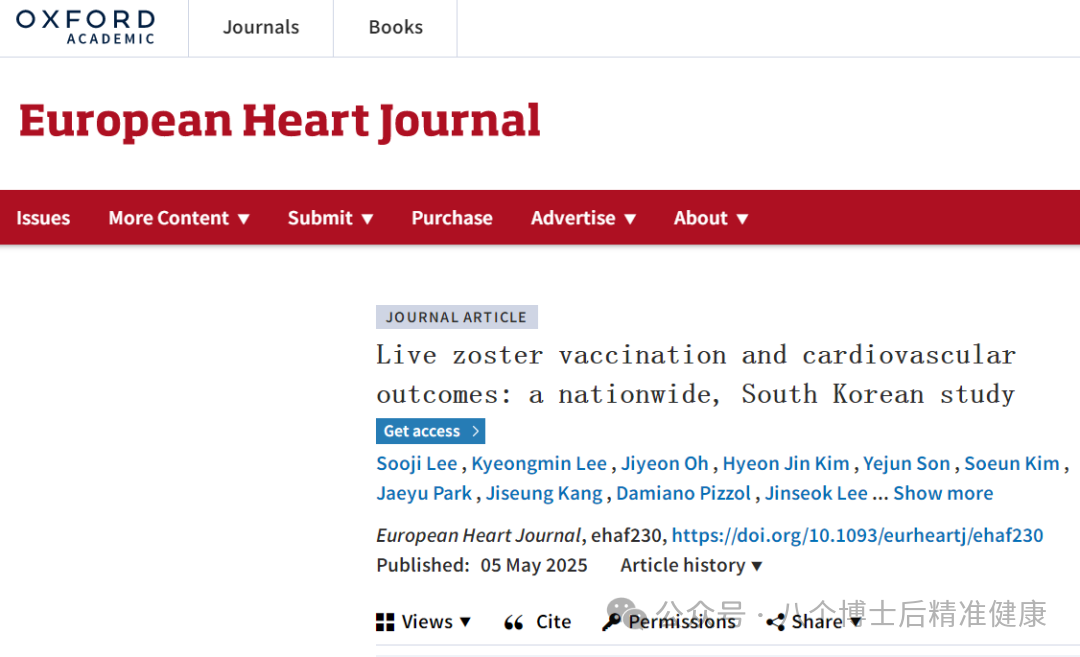
European Heart Journal Original Text
Previous studies have suggested a possible link between shingles and an increased risk of cardiovascular disease; however, research on whether receiving the shingles vaccine can actually reduce this risk remains relatively limited—precisely the question that the researchers in this study aim to explore.
Key Research Findings
This study focuses on South Koreans aged 50 and older, incorporating data from over 2.2 million individuals collected between January 1, 2012, and December 31, 2021. After rigorous data processing, the final analysis included more than 1.27 million participants in the weighted cohort, with an average age of 61.3 years. Men accounted for 43.2% of the cohort, and the median follow-up duration was 6 years!
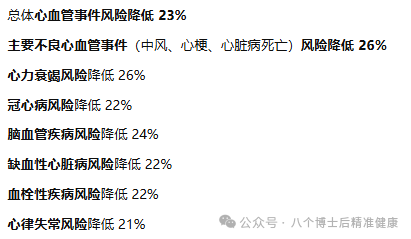
More notably, men, individuals under 60 years old, those with unhealthy lifestyles, as well as low-income families and rural residents, have benefited even more noticeably!
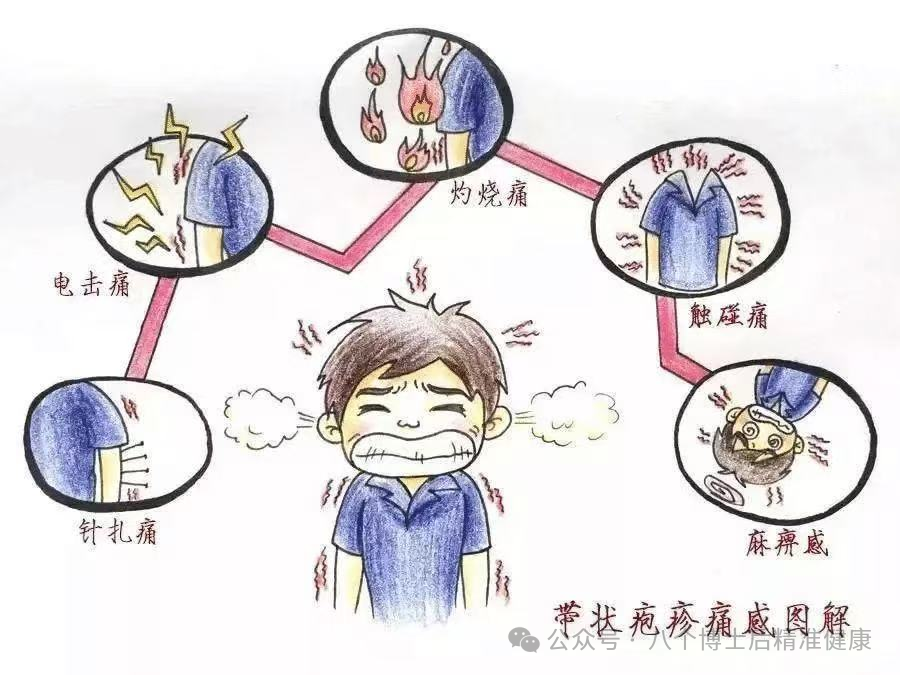
How does the shingles vaccine "cross over" to protect cardiovascular health?
Simply put: The "cross-border" effect of the shingles vaccine lies in its ability to reduce the inflammation and immune cascade triggered by viral reactivation, thereby alleviating chronic damage to the cardiovascular system at its root!
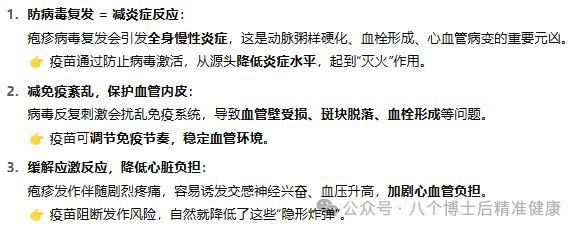
1. Block the vascular damage and inflammatory response triggered by the virus—Shingles is caused by the varicella-zoster virus (VZV), which not only leads to skin symptoms but also harms the cardiovascular system through the following mechanisms:
Vascular endothelial damage: The virus can directly invade vascular endothelial cells, triggering vascular inflammation and dysfunction, thereby increasing the risk of atherosclerosis.
Systemic inflammation: After infection, the body releases large amounts of pro-inflammatory cytokines (such as IL-6 and TNF-α). Prolonged inflammatory states can accelerate plaque formation and thrombus development.
Thrombosis: Viral infections can activate platelets, promoting a hypercoagulable state in the blood and increasing the risk of myocardial infarction and ischemic stroke.
The vaccine prevents shingles infections, directly reducing the occurrence of the aforementioned pathological processes—and thereby lowering the risk of cardiovascular events.
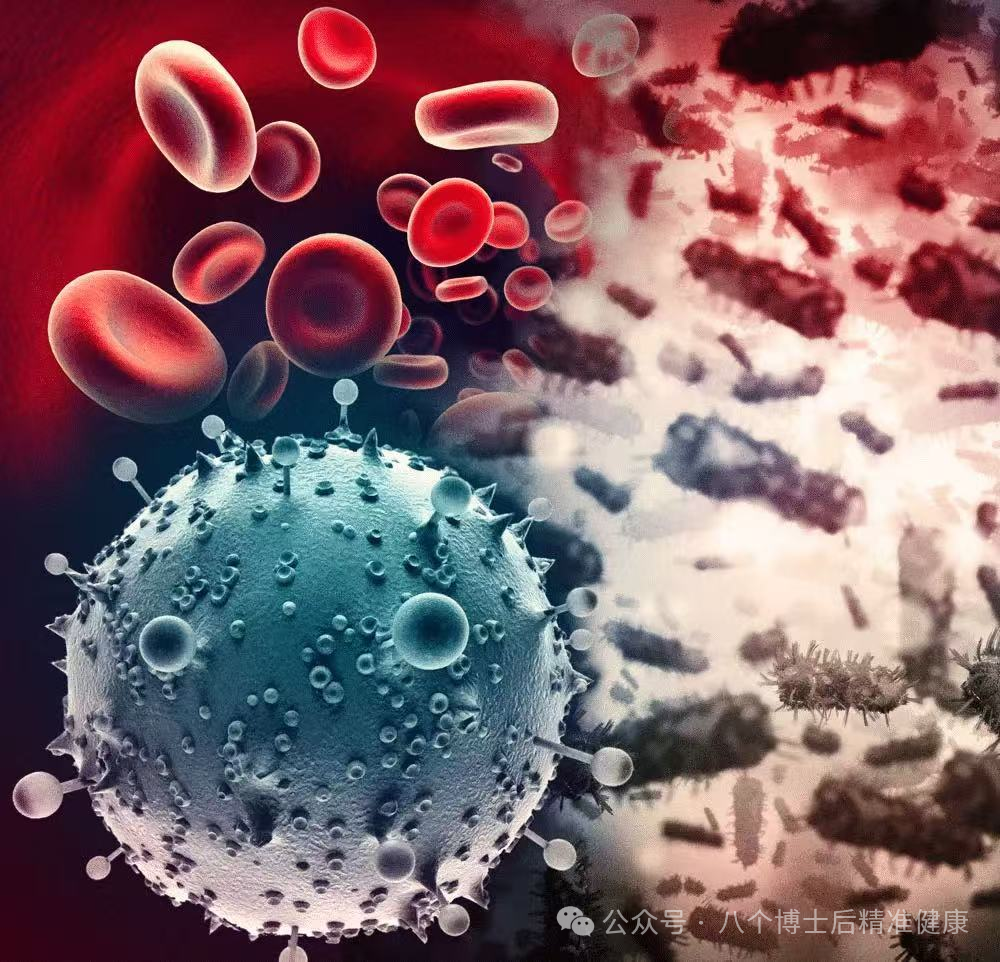
2. Immune-modulating effects—vaccines may indirectly improve cardiovascular health by boosting immune system function.
Reducing the risk of viral reactivation: After vaccination, the immune memory induced by the vaccine can suppress the reactivation of the virus during its latent phase, thereby minimizing repeated attacks on blood vessels and nerves.
Reducing the burden of chronic inflammation: Vaccines help control infections, lowering systemic inflammation levels and thereby slowing the progression of atherosclerosis and heart disease.
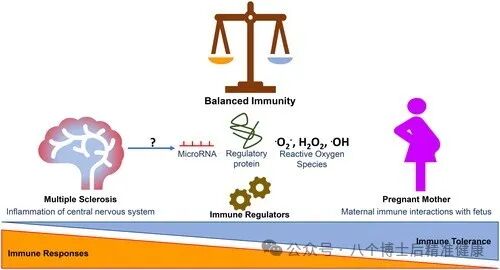
3. Benefit mechanisms in specific populations—Research shows that men, younger individuals (under 60), and those with unhealthy lifestyles experience more significant benefits!
Differences in immune responses: Younger individuals have stronger immune systems, leading to higher vaccine-induced antibody levels and more effective control of the virus.
Baseline risk is higher: Individuals with unhealthy habits such as smoking and drinking already have elevated cardiovascular risks. The vaccine, by mitigating the cumulative viral damage, delivers a more pronounced relative protective effect.
Gender differences: Men may benefit more prominently due to vaccine effectiveness or the regulatory role of hormones on immune responses!

4. The Potential Mechanism Behind Long-Lasting Protective Effects—Vaccine protection can last up to 8 years
Immune memory persistence: Vaccine-induced T cells and antibodies persist long-term, continuously suppressing viral reactivation.
Cumulative inflammation prevention: Long-term avoidance of recurrent infections helps reduce cumulative damage to the vascular system.
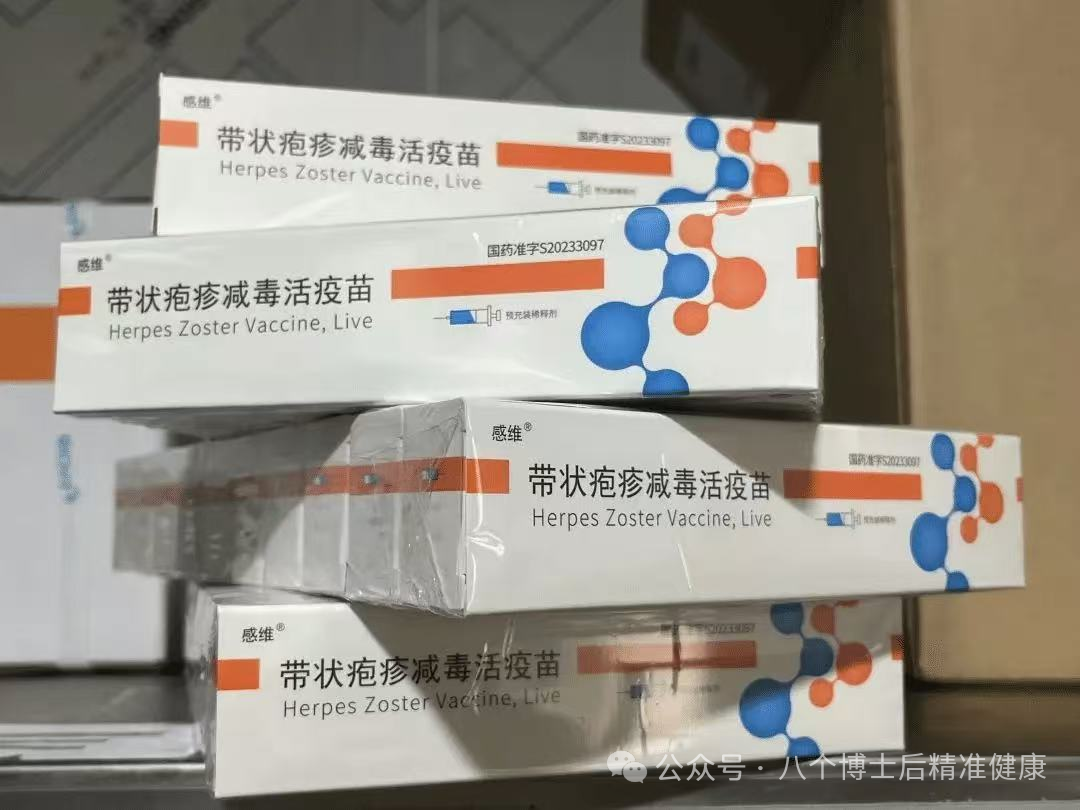
Take you to learn about shingles:
The primary cause of shingles outbreaks is a decline in one's own immune system.
Shingles is an infectious skin disease caused by the varicella-zoster virus. Over 90% of adults carry the varicella-zoster virus silently within their bodies. When children are infected with this virus during childhood, their first outbreak typically results in chickenpox!

After encountering an attack from the immune system, the virus isn’t completely eliminated—it simply hides away in the dorsal root ganglia. When the body’s immune defenses weaken, the dormant virus lies in wait, ready to strike. It then travels along the nerves, causing mischief by triggering inflammation and even nerve cell death, ultimately leading to excruciating pain.
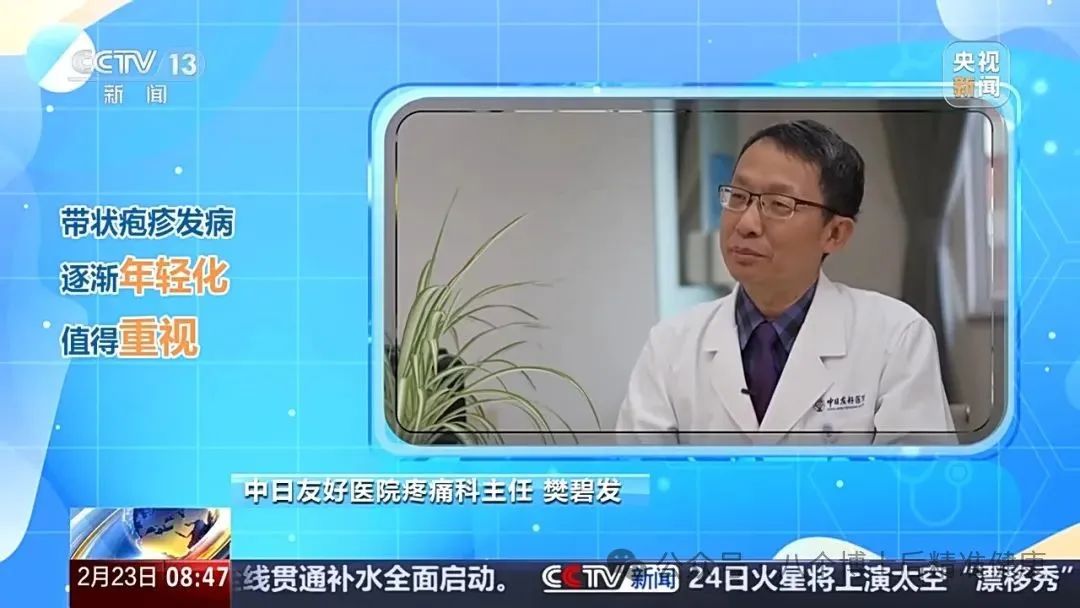
Contrary to what many people believe, shingles is essentially a "recurrence," not a "reinfection." In other words, a person contracts chickenpox only once in their lifetime. However, as they age and their immune system weakens—due to factors like overwork, chronic illnesses, or high stress levels—the dormant virus lurking in the body may reactivate years later, triggering shingles!

In the future, as research on recombinant vaccines advances, vaccinating against cardiovascular diseases may become as routine a practice as preventing influenza or shingles... Currently, this research has already unveiled the "hidden benefits" of the shingles vaccine—beyond protecting against cardiovascular disease, the herpes vaccine may also help reduce the risk of dementia!
Two NEWS
New evidence suggests herpes vaccine may protect against dementia! But why does the shingles vaccine "cross over" to reduce dementia risk?
In the previous article, we have already provided科普 on Alzheimer's disease multiple times: Alzheimer's disease might finally have a cure! Haven't you heard about the latest groundbreaking research published in the top medical journal *Nature*? / U.S. study finds! Can Tai Chi really improve symptoms of Parkinson's and dementia in the elderly? / Can 40-Hz audio help improve dementia? Let’s take a look at the findings of this study...

In the minds of many people, Alzheimer's disease—commonly known as senile dementia—is seen as a natural result of brain nerve degeneration, with little to no connection to viruses or vaccines...
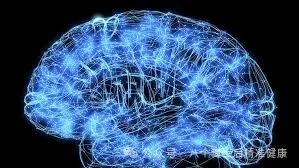
However, recent studies have increasingly revealed that the onset of neurodegenerative diseases may be closely linked to viral infections and chronic inflammation.
Surprisingly, the vaccine originally developed to prevent shingles has unexpectedly shown potential to "cross over" and reduce the risk of dementia!


Today, JAMA published a paper from a research team at Stanford University, in which the researchers analyzed health data from more than 100,000 people in Australia.
On November 1, 2016, Australia launched a shingles vaccination program, offering free vaccinations to seniors aged 70 to 79. While not all eligible seniors chose to get vaccinated, overall, during the 7.4-year follow-up period, the absolute risk of newly diagnosed dementia among eligible seniors was reduced by 1.8% (5.5% vs. 3.7%)!
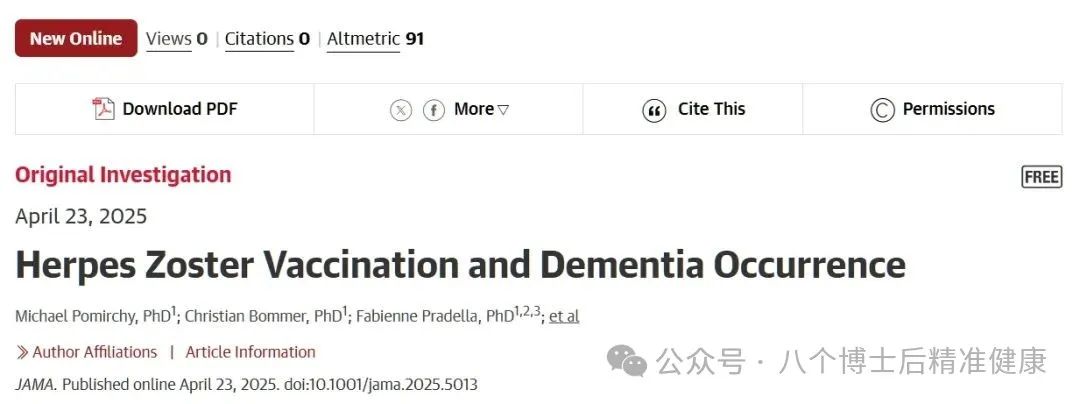
Paper Title Image
The findings of this study corroborate another paper previously published in Nature magazine:
Wales in the UK has a similar vaccination policy. Analysis of data from 300,000 people reveals that receiving the shingles vaccine not only reduces the relative risk of developing shingles by 37.2% over seven years but also lowers the risk of dementia by approximately 20%!

In recent years, there has been considerable research into the mechanisms linking viral infections with nerve damage, as well as the neuroprotective effects of corresponding vaccines. Getting vaccinated against shingles can truly be described as killing multiple birds with one stone!
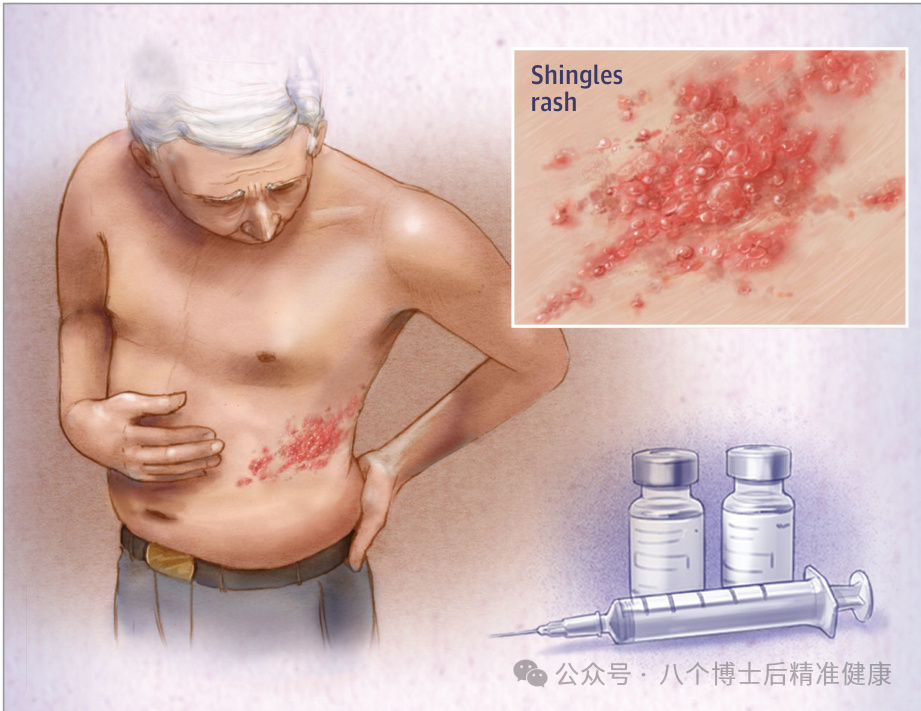
Starting from November 1, 2016, the project has been offering a single dose of attenuated live vaccine (Zostavax) free of charge to seniors aged 70 to 79. Cleverly leveraging this "age threshold," the research team employed a regression discontinuity (RD) design to compare differences between individuals whose birth dates fell just before and just after the vaccination eligibility cutoff date (November 2, 1936)!
The study found
1. Among individuals eligible for vaccination, the incidence of dementia decreased by 1.8 percentage points over a 7.4-year follow-up period (from 5.5% to 3.7%). Even after adjusting for differences in follow-up duration and refining the analysis population, this trend remained statistically significant, highlighting the robustness of the findings!
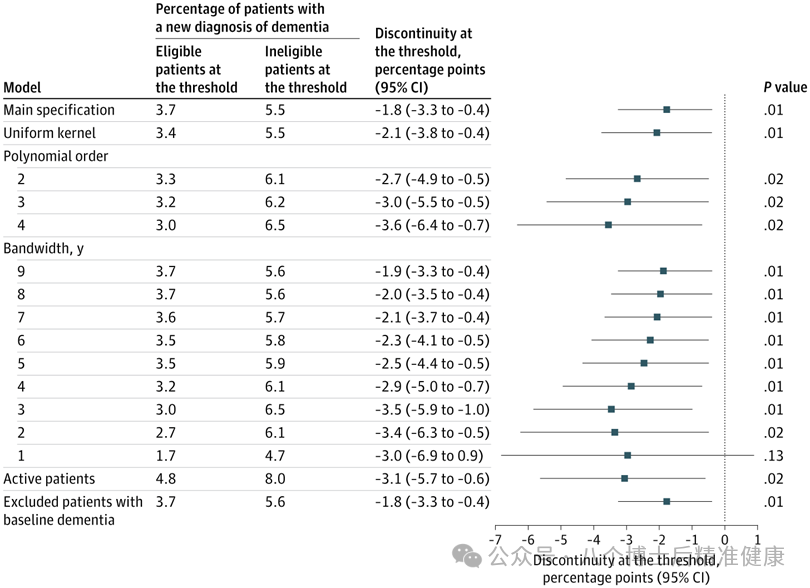
(The Impact of Free Vaccination Eligibility on the Probability of Newly Diagnosed Dementia)
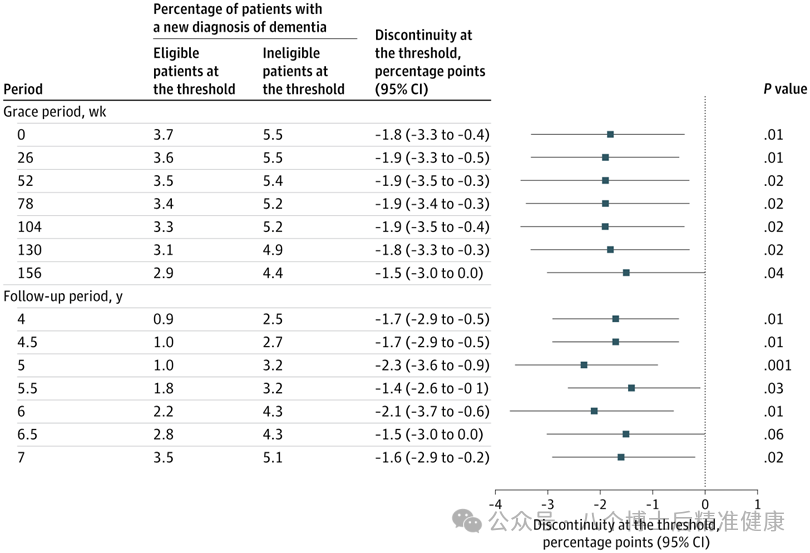
(Analysis Results Across Different Follow-up Durations and Population Ranges)
2. More importantly, this vaccination policy has indeed encouraged more people to get vaccinated: simply by "extending life expectancy by one week," it boosted the vaccination probability by 16.4%. Over a broader time frame, the vaccination rate among eligible individuals soared to 30.2%, significantly higher than the 6.5% observed among those who were ineligible—effectively creating a well-matched "natural experimental setting" for meaningful comparison!

Notably, this study found no gender differences—both men and women showed essentially the same protective effect against dementia conferred by the vaccine. This finding contrasts with previous research conducted in the UK, yet it also suggests that the vaccine's protective potential may be broadly applicable across genders.

Why can the shingles vaccine "cross over" to reduce dementia risk?
Research findings indicate that diagnoses of shingles, pneumonia, and fungal infections are all associated with an increased risk of AD, while receiving the corresponding vaccines is linked to a reduced risk of AD...
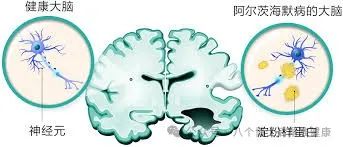
Researchers believe that various pathogens are linked to AD risk, suggesting that it may be immune dysfunction and inflammation triggered by infection—rather than any specific pathogen—that play a key role in neuronal damage. Vaccines can, to some extent, boost the immune system, which also helps explain the differences in effectiveness between live-virus vaccines and recombinant vaccines!
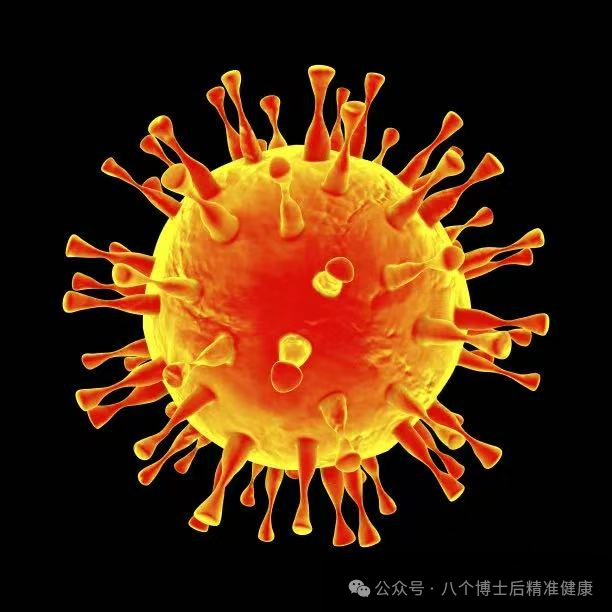
1. Reduce the risk of neurological damage caused by viral infections
Chickenpox—reactivation of the varicella-zoster virus can damage the nervous system and increase the risk of dementia in older adults. Vaccination against shingles helps prevent viral reactivation, reducing this risk of damage!
2. Alleviate inflammatory responses
Infection triggers inflammation, and chronic inflammation over the long term may contribute to neurodegenerative disorders. Vaccines reduce both infection and inflammation, thereby lowering the risk of developing Alzheimer's disease in older adults...
3. Enhance immune function
Getting vaccinated can activate the immune system, enhance immune surveillance and clearance abilities, maintain immune balance, and help protect nerve cells, thereby reducing the risk of neurodegenerative diseases!
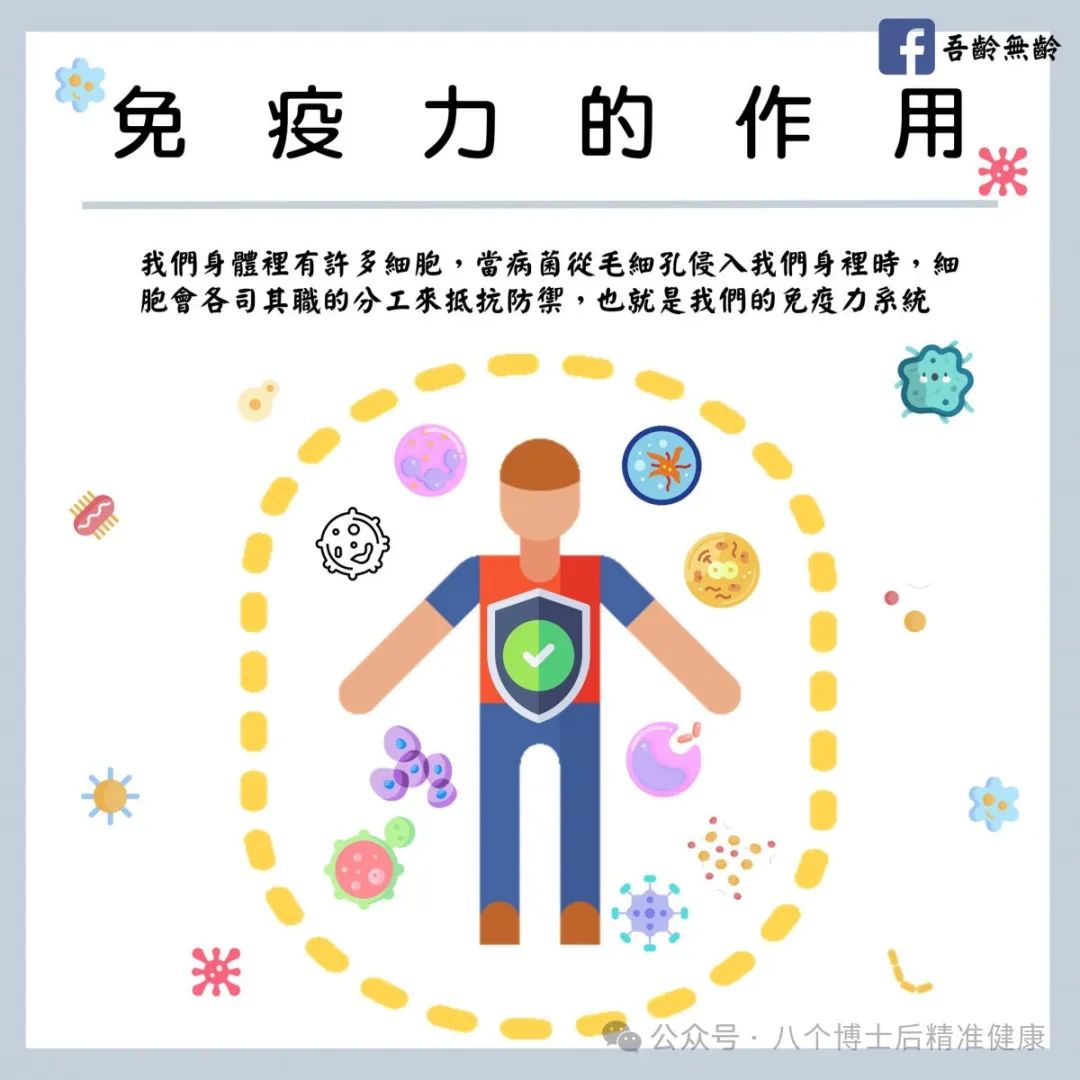
4. Maintain Vascular Health
Vaccines prevent shingles, indirectly protect blood vessels, ensure optimal blood supply to the brain, and provide a stable physiological environment for nerve cells, thereby helping to maintain cognitive function.
5. Improve the Brain's Microenvironment
Reducing inflammation helps maintain a stable brain microenvironment, ensuring the balance of neurotransmitters and nutrients, which in turn supports neuronal communication and optimal function—positively contributing to the preservation of cognitive abilities!
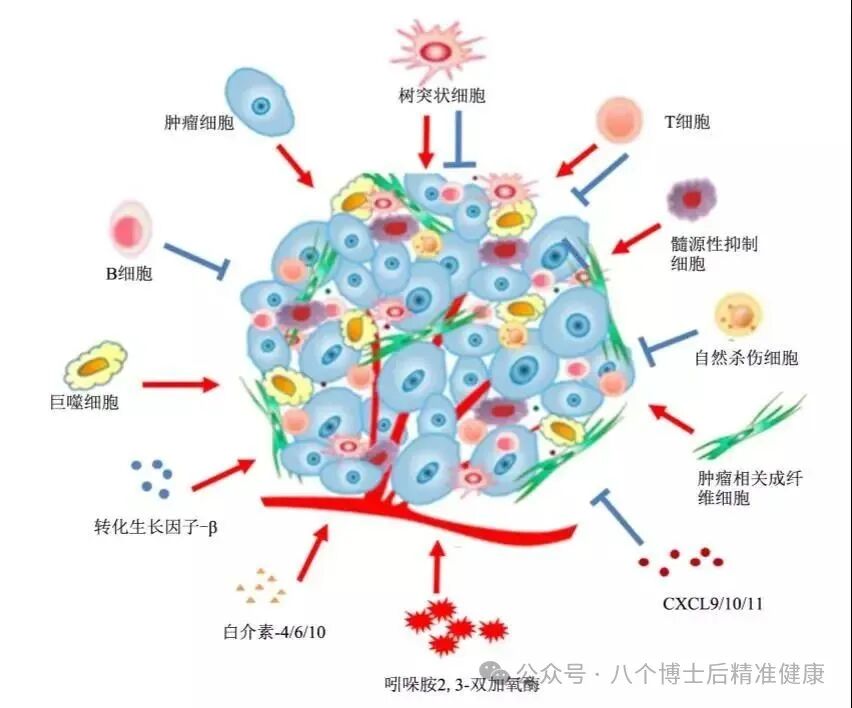
As we’ve seen, the herpes vaccine is not just a shot to prevent rashes—it could very well become a vaccine that protects the brain as well. Its potential dementia-fighting benefits aren’t accidental; rather, they’re grounded in the increasingly clear link between viruses, inflammation, and neurodegeneration!
Three NEWS
United IPSC Advanced Therapy—Bringing New Hope to Patients with Cardiovascular Diseases and Alzheimer's!
Did you know? In the treatment of cardiovascular diseases, depression, Alzheimer’s disease, and other conditions, stem cell technology is already rewriting the rules of medical therapy—as a “cell-level repair specialist”—especially with induced pluripotent stem cells (iPSCs)!

The Mechanism of Stem Cells in Alzheimer's Disease Treatment
1. Repair the blood-brain barrier
The importance of the blood-brain barrier: The blood-brain barrier serves as the brain's "city wall," preventing harmful substances from entering and protecting the brain from external threats. In patients with Alzheimer's disease (AD), the blood-brain barrier gradually becomes compromised, allowing harmful substances to infiltrate the brain and further damage neurons.
The restorative role of stem cells: Stem cells possess the remarkable ability to promote angiogenesis—they can repair damaged blood-brain barriers just as effectively as mending a breached dam. By strengthening the brain’s protective barrier and reducing the entry of harmful substances, they help safeguard neurons from further injury.
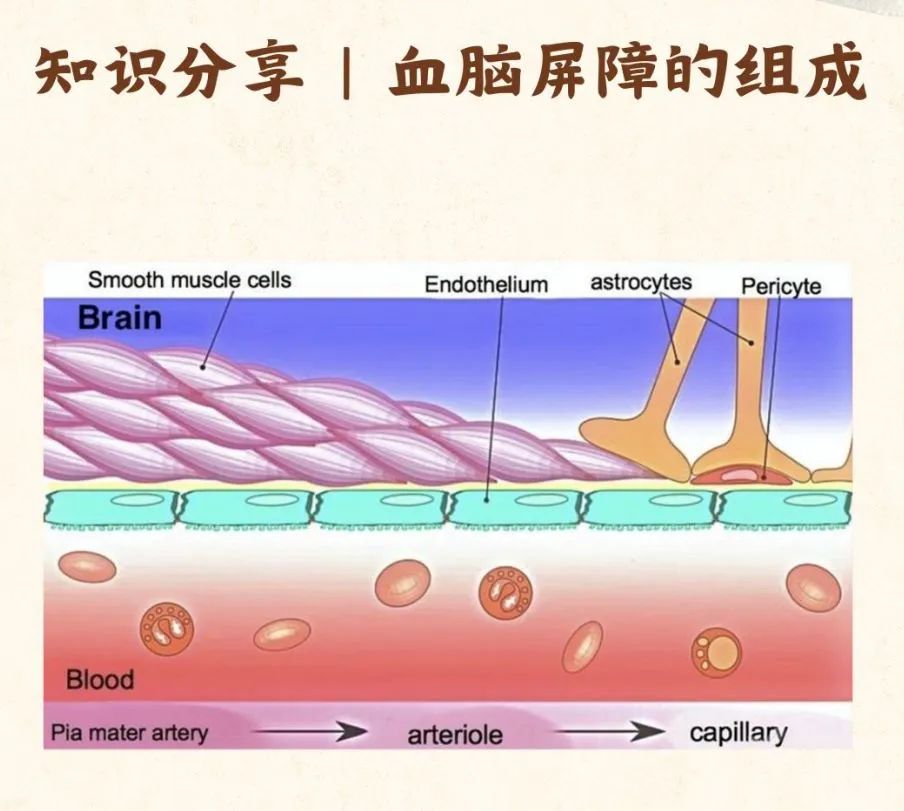
2. Suppress Neuroinflammation
The dangers of neuroinflammation: In the brains of AD patients, immune cells called microglia become overactive and mistakenly attack healthy neurons, triggering neuroinflammation. This chronic inflammatory state accelerates neuronal damage and death, ultimately leading to a decline in cognitive abilities.
The anti-inflammatory effects of stem cells: Stem cells can secrete anti-inflammatory factors that suppress the overactivation of microglia, thereby alleviating neuroinflammation. By reducing inflammatory responses, stem cells provide much-needed relief to damaged brain tissue, helping to protect and repair neurons.
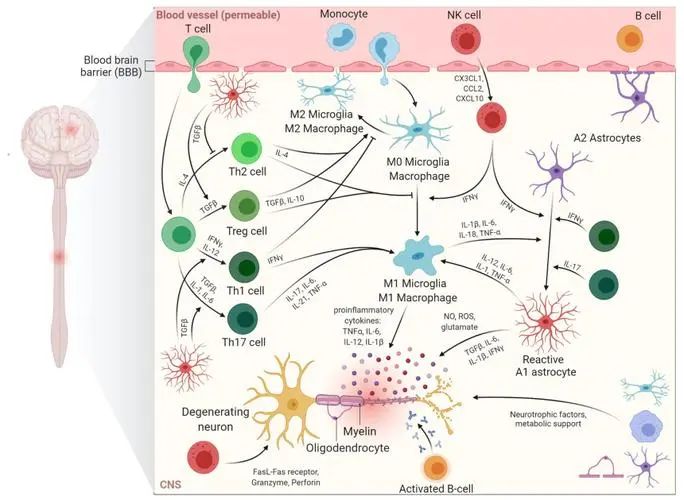
3. Regulate the immune system
The impact of immune system imbalance: In the progression of AD, immune system imbalance also plays a significant role. Attacks on neurons by immune cells such as T cells can exacerbate brain damage.
The immunomodulatory role of stem cells: Stem cells can regulate the function of the immune system, reducing T-cell attacks on neurons and minimizing immune-mediated damage in the brain. Additionally, blood tests revealed that after stem cell therapy, sTIE2 levels dropped by 49%, suggesting that stem cells help stabilize the vascular system and improve the brain's microenvironment—further supporting neuronal health and function.
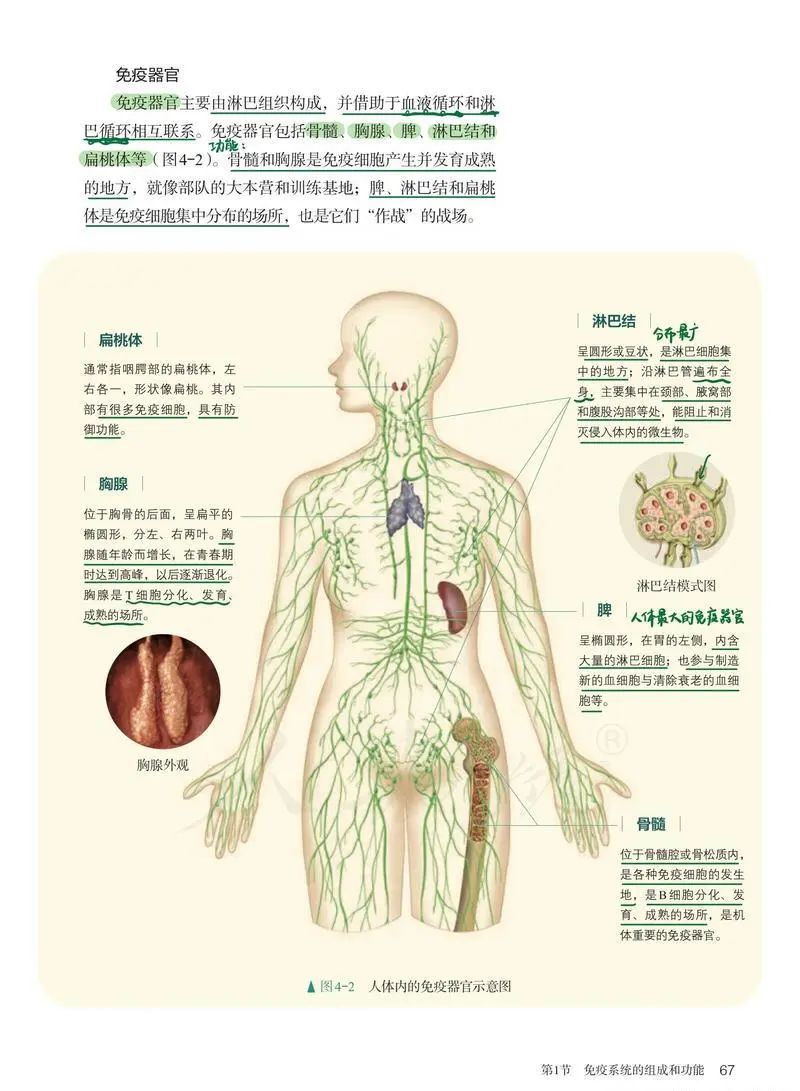
The Application of iPSCs in Alzheimer's Disease Research and Treatment
1. Disease Model Establishment
By differentiating iPSCs into neurons, it is possible to simulate the pathological processes of Alzheimer's disease in vitro and study the disease's early changes. This model helps deepen our understanding of the disease's underlying mechanisms, providing a theoretical foundation for developing new therapeutic approaches.
2. Drug Screening
Using neuron models derived from iPSCs, large-scale drug screening can be conducted to identify potential compounds that effectively improve neuronal function and mitigate pathological damage. This accelerates the drug discovery process and enhances R&D efficiency.
3. Cell Replacement Therapy
iPSCs can also be used in cell-replacement therapies to provide new cells for damaged neural networks, holding promise for repairing brain function. By transplanting healthy neurons derived from the differentiation of iPSCs, it may be possible to partially restore normal brain activity, offering fresh hope to patients with Alzheimer’s disease.
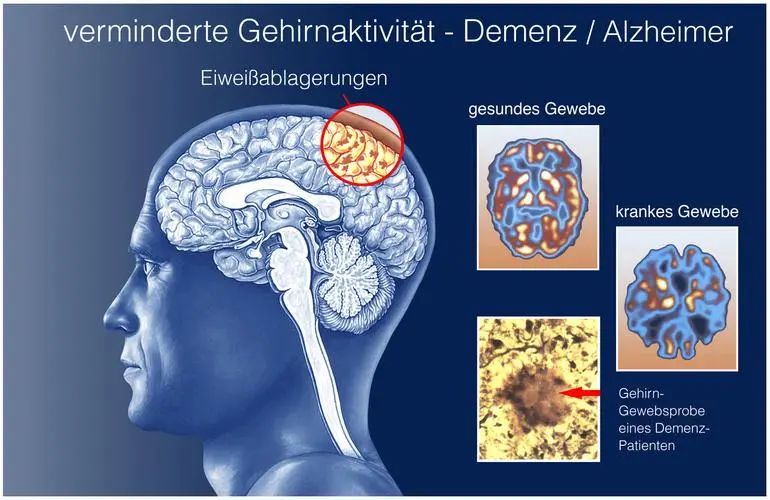
Why is IPSC important, and why shouldn't it be overlooked?
1. Advance research progress
iPSC technology has provided researchers with a new tool and platform for Alzheimer's disease studies, enabling scientists to simulate the disease process in vitro and delve deeper into its pathological mechanisms. This is highly significant for developing targeted therapeutic approaches!
2. Provide new treatment strategies:
In terms of treatment, the cell-replacement potential of iPSCs has opened up new avenues for Alzheimer's disease therapy. Although currently still in the research phase, they hold promising potential to become an effective therapeutic approach in the future.
3. The Potential of Personalized Medicine:
iPSCs can also be customized into patient-specific therapies, reducing immune rejection and enhancing treatment efficacy. The potential of this personalized medicine approach makes iPSCs hold great promise for the treatment of Alzheimer's disease!
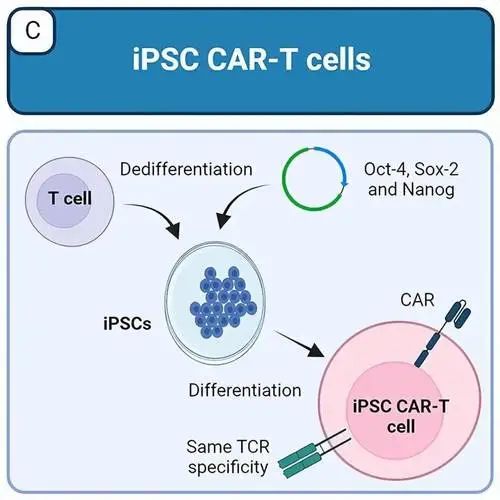
The Mechanism of Stem Cells in the Treatment of Cardiovascular Diseases
1. Replace damaged cells
Cardiovascular diseases often lead to the damage and death of cardiomyocytes and other cells. Stem cells can differentiate into cardiomyocytes, endothelial cells, and more, replacing dead cells, repairing damaged tissues, and restoring the heart's normal structure and function!
2. Promote vascular regeneration
Stem cells can secrete a variety of cytokines, such as vascular endothelial growth factor (VEGF) and fibroblast growth factor (FGF). These factors stimulate angiogenesis, enhance myocardial blood perfusion, alleviate myocardial ischemia, and thus hold significant therapeutic potential for cardiovascular diseases like coronary heart disease...
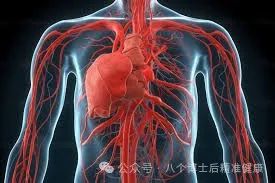
3. Secrete nutritional factors
Stem cells can secrete nutrients such as antioxidant stress factors and anti-inflammatory agents, protecting cardiomyocytes from oxidative stress and inflammatory damage. They can also inhibit cardiomyocyte apoptosis, creating a favorable environment for cardiac repair and regeneration.
4. Regulate Immune Responses
Cardiovascular diseases are often accompanied by inflammatory responses, which exacerbate myocardial damage. Stem cells possess immunomodulatory functions, enabling them to suppress inflammatory reactions, reduce myocardial inflammation and injury, and thereby alleviate the condition.
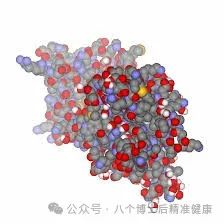
5. Stimulate the heart's own repair mechanisms
Stem cells can activate the heart's intrinsic repair mechanisms, stimulating the proliferation and differentiation of the heart's own stem cells and progenitor cells, thereby enhancing the heart's natural regenerative capacity and improving therapeutic outcomes!
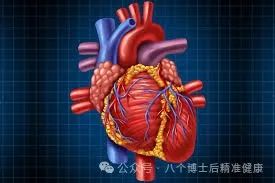
In summary, stem cells play a crucial role in the treatment of Alzheimer's disease and cardiovascular disorders through multiple mechanisms, including repairing the blood-brain barrier, suppressing neuroinflammation, and modulating the immune system. Meanwhile, iPS cells, as multipotent cells, not only hold significant value in establishing disease models and screening drugs but also pave the way for cell-replacement therapies!
Four NEWS
Summary

Overall, from "preventing rashes" to "protecting blood vessels" and even "nurturing brain health," the shingles vaccine is quietly expanding its medical boundaries in ways that go beyond expectations. It’s no longer just a "routine recommendation" for older adults—instead, it has the potential to become a key component in preventing chronic diseases, slowing down aging, and safeguarding the quality of life in later years.
With the advancement of cutting-edge regenerative medicine therapies like iPSCs, our approach to combating cardiovascular and neurodegenerative diseases is undergoing a fundamental transformation—from "passive treatment" toward "proactive prevention and regenerative repair." Perhaps in the future, living a long life will no longer be a luxury, and aging healthily will no longer remain just an aspiration—it could become a scientifically achievable reality, step by step!
Recommended News
Share:






